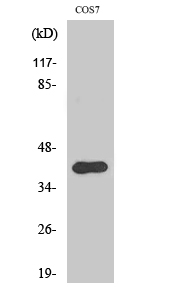
| WB | 咨询技术 | Human,Mouse,Monkey |
| IF | 咨询技术 | Human,Mouse,Monkey |
| IHC | 1/50-1/100 | Human,Mouse,Monkey |
| ICC | 1/50-1/200 | Human,Mouse,Monkey |
| FCM | 咨询技术 | Human,Mouse,Monkey |
| Elisa | 1/10000 | Human,Mouse,Monkey |
| Aliases | AIFM2; AMID; PRG3; Apoptosis-inducing factor 2; Apoptosis-inducing factor homologous mitochondrion-associated inducer of death; Apoptosis-inducing factor-like mitochondrion-associated inducer of death; p53-responsive gene 3 protein |
| Entrez GeneID | 84883 |
| WB Predicted band size | Calculated MW: 41 kDa; Observed MW: 38 kDa |
| Host/Isotype | Rabbit IgG |
| Antibody Type | Primary antibody |
| Storage | Store at 4°C short term. Aliquot and store at -20°C long term. Avoid freeze/thaw cycles. |
| Species Reactivity | Human,Mouse,Monkey |
| Immunogen | Synthesized peptide derived from the Internal region of human AMID. at AA rangle: 110-190 |
| Formulation | Purified antibody in PBS with 0.05% sodium azide,0.5%BSA and 50% glycerol. |
+ +
以下是关于FSP1抗体的3-4篇参考文献及其简要摘要:
1. **"Fibroblast Activation Protein Alpha (FAP) and Fibroblast-Specific Protein 1 (FSP1) in Cancer-Associated Fibroblasts: Implications for Biomarker Discovery"**
- **作者**: Sahai, E. et al.
- **摘要**: 该综述讨论了FSP1作为癌症相关成纤维细胞(CAFs)的生物标志物的潜力,比较了其与其他标志物(如α-SMA)的特异性,并强调其在肿瘤微环境中的作用及抗体应用中的挑战。
2. **"Distinct Fibroblast Lineages Shape Fibrotic Response in Murine Models"**
- **作者**: Kalluri, R. et al.
- **摘要**: 通过小鼠模型研究发现,FSP1阳性成纤维细胞在器官纤维化中具有关键作用,其抗体标记技术帮助定位了纤维化病灶中的特定细胞亚群,为治疗靶点提供依据。
3. **"Validation of Antibodies for Specific Detection of FSP1 in Human Tissues"**
- **作者**: LeBleu, V.S. et al.
- **摘要**: 该研究系统评估了多种商业FSP1抗体的特异性,指出部分抗体存在与非靶蛋白的交叉反应,强调了在实验设计中严格验证抗体可靠性的必要性。
4. **"Single-Cell RNA Sequencing Reveals Heterogeneity of FSP1 Expression in Tumor Stroma"**
- **作者**: Öhlund, D. et al.
- **摘要**: 利用单细胞测序技术,发现FSP1在肿瘤间质中的表达具有细胞亚型异质性,挑战了传统抗体染色结果的解读,建议结合多标志物进行CAFs分型。
这些文献覆盖了FSP1抗体的应用场景、验证方法及技术争议,适用于肿瘤生物学和纤维化研究领域。
The Fibroblast Specific Protein 1 (FSP1), also known as S100A4. is a calcium-binding protein belonging to the S100 family. Initially identified as a marker for fibroblasts, FSP1 is expressed in various mesenchymal cells, including fibroblasts, immune cells, and certain cancer cells. It plays a critical role in cellular processes such as migration, invasion, and extracellular matrix remodeling, linking it to pathological conditions like cancer metastasis, fibrosis, and chronic inflammation. In cancer biology, FSP1 is associated with epithelial-mesenchymal transition (EMT), facilitating tumor cell dissemination and stromal interactions. Recent studies highlight its dual role in fibrosis—promoting fibroblast activation in diseases like pulmonary fibrosis, liver cirrhosis, and kidney fibrosis—while also exhibiting context-dependent immunomodulatory effects.
FSP1 antibodies are widely used to detect FSP1 expression in tissue samples, aiding in the identification of fibroblast populations within tumor microenvironments or fibrotic lesions. These antibodies have become essential tools in research exploring fibroblast heterogeneity, stromal-tumor crosstalk, and therapeutic targeting of fibrosis or metastasis. However, debates persist regarding its specificity, as FSP1 may be expressed in non-fibroblastic cells under certain conditions. Despite this, FSP1 remains a valuable biomarker for studying fibroblast-driven pathologies, with emerging interest in its potential as a therapeutic target to disrupt fibrotic pathways or metastatic niches.
×